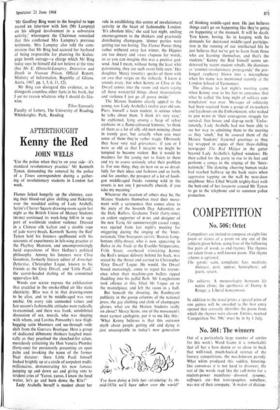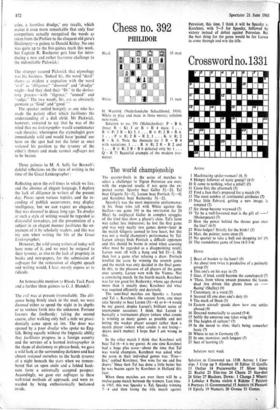No. 504: The winners
Out of a particularly large number of entries for this week's Word Game it is remarkable that all bar a bare dozen or so chose to back that well-tried, much-hacked veteran of the literary competitions, the neo-Johnson parody. What whim produced this sudden, lemming- like consensus it is not hard to discover; the rest of the words read like the cuff-notes for a student-power manifesto— doomed, tyranny, suffrages, etc—but lexicographer, somehow, was not of their company. 'A maker of diction-
aries, a harmless drudge,' one recalls, which makes it even more remarkable that only four competitors actually recognised the words as taken from the Preface to the eloquent old guru's Dictionary—a guinea to Donald Kitley. No one was quite up to the five-guinea mark this week, but Captain R. Rochester gets four for intro- ducing a new and rather fearsome challenge to the indomitable Pickwick: The stranger assured Pickwick that etymology was his business. 'Indeed Sir, the word "devil" shows as evident a cognation with the word "evil" as "diligence," "doomed" and "drudge" might—had they shed their "Ds" in the deriva- tory process—with "iligence," "oomed" and "rudge." The two words, Sir, are as obviously germane as "God" and "good."' The speaker smiled benignly as one who has made the patient effort which facilitates the understanding of a dull child. Mr Pickwick, however, ventured to say that he was of the mind that no lexicographer would countenance such theories; whereupon the etymologist grew immediately wild and would have 'pasted' our hero on the spot had not the latter at once resigned his position to the tyranny of the other's threats and made earnest suffrages not to be beaten.
Three guineas to M. A. Sully for Boswell's doleful reflections on the state of writing in the time of the Great Lexicographer:
Reflecting upon the evil times in which we live, and the absence of elegant language, I deplore the lack of diligence in writers of the present day. Pieces upon various topicks, and the re- cording of publick occurrences, may display intelligence, but we can expect no elegance; that was doomed to decay long ago. To drudge at such a style of writing would be regarded as distasteful nowadays, yet the presentation of a subject in an elegant manner facilitates the en- joyment of it by scholarly readers, and this was my aim when writing the life of the Great Lexicographer.
However, the wild young writers of today will have none of it, and we must be resigned to their tyranny, as also to the lack of propriety in books and newspapers, for the submission of suffrages for the restoration of elegant speech and writing would, I fear, merely expose us to ridicule.
An honourable mention to Rhoda Tuck Pook and a further three guineas to G. J. Blundell:
The evil was at present irremediable. The dili- gence being firmly stuck in the mud, we were doomed either to spend the night in its depths or to venture forth into the unknown. Fortune favours the foolhardy: taking the second course, after walking only half a mile we provi- dentially came upon an inn. The door was opened by a poor drudge who spoke no Eng- lish. Being equally without the linguistic ability that facilitates progress in a foreign country and the services of a learned lexicographer in the shape of dictionary or phrase-book, we gave a wild look at the surrounding darkness and had almost resigned ourselves to the harsh tyranny of a night beneath the stars when we remem- bered 'that an open smile and a folded bank- note form a universally accepted passport. Accordingly, we gave our suffrages to these well-tried methods of approach, and were re- warded by being enthusiastically beckoned inside.







































 Previous page
Previous page